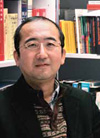Japanese Modernity as Postcolonial Experience
During the fall semester 2011 Jun’ichi Isomae joined the URPP Asia and Europe as a visiting scholar. In his essay he ponders the notion of traveling theories as well as the importance of postcolonial studies for non-Western experiences.
Jun’ichi Isomae
Almost ten years ago, however, at a well-known American university, I was treated as a native informant. They expected me not to lecture on theory, but rather to supply a firsthand Japanese perspective. In my Japanese religions seminar, an American professor suddenly made me stop lecturing after my elaboration on the subject matter. “Now it is our [the Americans] turn to interpret this information about Japanese religion with which Jun’ichi [the Japanese native] has provided us,” he stated. Their attitude as colonizers angered me, so I criticized them: “Contrary to what you think, your understanding of Japanese religion is artificial. Today I will problematize your monolithic concept of it through my way of interpretation.” The atmosphere of my classroom turned drastically worse, so that many professors turned silent and appeared baffled. They seemed unhappy with this dissent from a Japanese scholar whom they apparently presumed would be quite cooperative in the role of native informant. By the following week, everyone had withdrawn from the seminar with the exception of a few students and administrators, reducing what was originally a group of over twenty to a group of three. Gradually, several more (non-Western) graduate students and administrators―but no professors― joined the seminar.
Area studies in the service of the Cold War
That experience occurred nearly ten years ago. Almost immediately after the publication of Harry Harootunian’s and Masao Miyoshi’s edited book Learning Places: The Afterlives of Area Studies in 2002―a criticism of the political commitments in U. S. area studies during the Cold War when American intellectuals, bureaucrats, and politicians sought information about how to establish anti-communist governance in Asian countries―the Death of a Discipline was declared for area studies. It was an identity crisis for this field of inquiry, whose rhetoric of collegiality had masked the inequality between American theorists and native informants. Harootunian’s view suggests that it was not coincidental that the people who joined my seminar were not American Anglo-Saxon professors but rather Asian graduate students and administrators: they found an opportunity to speak out by themselves not as native informants but as people engaging theories.
It was also an epoch-making time for postcolonial studies in general. For example, Homi Bhabha, an Indian scholar, became a professor in Harvard University’s department of English Literature, which had theretofore been occupied almost exclusively by American Anglo-Saxon professors. Around the same time, Edward Said of Columbia University passed away. However, Said’s promotion of postcolonial studies along with Bhabha and Gayatri Spivak helped to bring these studies to the forefront of American academia. They succeeded in making it possible for non-Western scholars to speak out as theoretical intellectuals before a Western audience. Western scholars do not occupy all theories, though a number of conservative scholars continue to operate under the influence of the Western theorist/native informant dichotomy. Said explains the transplantation of theory in terms of “traveling theories:”
“Like people and schools of criticism, ideas and theories travel―from person to person, from situation to situation, from one period to another. […] Such movement into a new environment is never unimpeded. It necessarily involves processes of representation and institutionalization different from those at the point of origin.”[1]
Hybridity instead of purity
Now, several years later, I am in Switzerland at the URPP Asia and Europe teaching young scholars from both European and non-European backgrounds about how, from an East Asian perspective, to use theories ranging from postmodernism to post-secularism, post-democracy, and post-colonialism. These young scholars do not mind receiving instruction from a non-native and non-English speaker. Based chiefly on intellectual curiosity, they seek to understand the viewpoints of figures such as Talal Asad, Said, Spivak, and Bhabha. Each one of these theorists is non-Western: they are Palestinian, Indian, Parsi, and Saudi Arabian, respectively. Yet they have utilized English to express non-Western experiences of hybridity in order to be heard internationally. They never insist on the polarity of the West and the rest. On the contrary, each one has had to survive under the postcolonial situation of hybridity (that is, the denial of any “pure” cultural origin). We should not forget the fact that these postcolonial, non-Western intellectuals have close Western ties, mainly to the U.S. They were educated and now teach at American-European universities. Furthermore, even though postcolonial studies began with a Palestinian and an Indian, they have gradually expanded to other areas in East Asia, including Korea, China, and Japan. Spivak has stated her dissatisfaction with India-centric postcolonial studies:
“I’m saying that a postcolonial criticism that is based upon the South Asian model is out of date. [...] [Y]ou cannot think about Latin America according to South Asia and you cannot think of what has happened in the post-Soviet world according to the South Asia model and certainly the role of Japan, Korea, Taiwan, in what you call Asia, cannot be thought of by the South Asian model.”[2]
In Korea, for example, Yun Haedong insists on the concept of a “grey zone” in order to criticize the anti-Japanese idea of a purity of Korean national identity that has played a crucial role in advancing Korean society’s modernization following the liberation from Japanese empire. During the colonial period, however, it was difficult for Koreans to maintain a sense of “Korean-ness” distinct from “Japanese-ness” inasmuch as Korea was under continual cultural and political pressure to be subject to Japan. This subjection was necessary for the securing of political rights and, correspondingly, for attaining equality with the Japanese. For Korean Lim Jiehyun, the postwar Korean nationalism was a reaction to the so-called “grey zone” that resulted in a hybrid Korean-Japanese identity. He characterized this nationalism as self-victimization.
Korean scholars who have studied and now teach in Korea have the ability to criticize the Korean political situation for the sake of the Korean people. Based on their experience of Korean modernity, they can differentiate their writings as distinct from South Asian postcolonial studies.
Japan’s Janus-headed situation
We also have the case of Japan, which involves an ambivalent experience of modernity not only as a colonizer of Asian countries but also as a place occupied by the U.S. Indeed, Japan has been represented as Asia to the West and as the West to Asia, swaying between these two poles. Japanese people have the potential advantage of conceptualizing their own history in terms of both perpetrator and victim, though their post-imperial status as a nation state often leads to a forgetting of their role as perpetrator. Through its experience of Hiroshima and Nagasaki, Japan often recognizes itself as the victim of war in order to advocate international peace.

But Japan must nevertheless articulate its experience not only as victim but also as invader. Recognizing this dual position in modern world history can enable the Japanese to share their singular experience with others through transnational theoretical work, which Kojin Karatani, Naoki Sakai, and Haruki Murakami are already pursuing in the humanities and literary studies.[3] Recalling Said’s phrase, we can say that each one of our experiences can undergo translation through “traveling theories.” In addition, Japan now has the experience of Fukushima―an experience of suffering they must relate to others in the world without narcissistically stressing their sense of victimhood. By now, the country has learned several lessons from this disaster: firstly, the notion that social security provides complete protection for people in advanced industrial societies is an illusion; and secondly, economic structures have maintained this illusion as a means of exploiting poor, marginal areas to the satisfaction of rich, metropolitan areas. The existence of nuclear plants has received support from this capitalistic, exploitative structure that has promoted Japan’s postwar economic prosperity. The Japanese should problematize this structure in order to address a worldwide audience under global capitalism.
Overcoming nationalities and disciplines Only through theories can we conceptualize reality. Theory comprises the lens through which we recognize what is real. Lacan stated that we cannot perceive naked reality, an observation that underscores the importance of theoretical work. Theory has the capacity to open up space for communication all over the world, but it also carries the risk of closing this space through national particularisms. Even in an academic context, we should be skeptical of words like “inter-national” or “inter-disciplinary,” since each of them presupposes the ideas of nationalism and established disciplines. At the same time, we don’t need to be multiculturalists who want to homogenize each individual culture. Rather, we should intend to show new directions toward trans-national and trans-disciplinary work, heterogenizing our experience and enabling an imagination- and compassion-based sharing between people without personal knowledge of one another.
[1] Edward W. Said, “Traveling Theory,” in The World, the Text, and the Critic, Cambridge (Mass.): Harvard University Press, 1983, 226.
[2] Gayatri Chakravorty Spivak, “Position without Identity―2004: An Interview with Gayatri Chakravorty Spivak by Yan Hairong,” in Other Asias, Malden, Oxford & Victoria: Blackwell Publishing, 2008, p.251.
[3] Kojin Karatani, Origin of Modern Japanese Literature, Durham: Duke University Press, 1993. Naoki Sakai, Translation and Subjectivity: On Japan and Cultural Nationalism, Minneapolis: University of Minnesota Press, 1997. The esteemed work of Haruki Murakami requires no introduction.
(Asia & Europe Bulletin, 1/2012, pp. 4–6)
